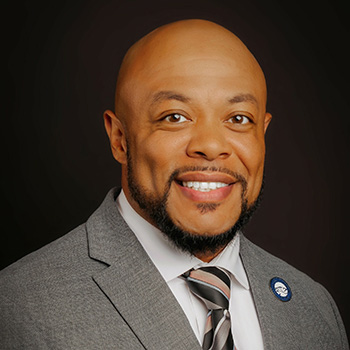
15
Vernon Stewart
Executive Director of Communications, El Paso County, Colorado
Vernon Stewart is the executive director of communications for El Paso County, the most populated county in the State of Colorado. He has a master's degree in public administration and a bachelor's degree in communications from the University of West Florida. He is also a proud Marine Corps veteran, having served in Operations Iraqi Freedom and Enduring Freedom. With a deep understanding of communication tactics and a passion for driving positive change, Stewart fosters strong relationships with media representatives, elected officials, staff and the community to elevate the impact of the county's mission.
What is the biggest challenge facing communication leaders today?
Communication leaders today face a tough job keeping up with the fast-paced digital world. They've got to stay on top of new technology, make their messages stand out in a sea of information and deal with the rise of social media taking over traditional media. Battling misinformation and fake news is a big deal, and earning audience trust in a skeptical world is no small feat. They also need to personalize content for diverse audiences while juggling privacy concerns. And when a crisis hits, they've got to be quick and smart in handling it in real-time, all while figuring out how to measure the success of their efforts. It's a lot on their plate, for sure.
How does your experience in the military inform your work in communications?
My military background has been instrumental in shaping my approach to communications, particularly through the diverse relationships formed with people from various backgrounds. In the military, you're constantly collaborating with individuals from a wide array of cultures and experiences. This exposure has been invaluable in understanding and respecting cultural differences, which is a critical aspect of effective communication. It allows for a more nuanced approach to crafting messages that resonate with multiple audiences. This understanding of diversity, coupled with the discipline, precision and crisis management skills honed in the military, equips me with a unique perspective and skill set in the field of communications. This blend of experiences enables me to navigate complex communication challenges with an inclusive and adaptable approach.
What professor or class at UWF made a big impact on your career?
During my undergraduate studies in communications, Dr. Athena Du Pre was a pivotal figure in my academic journey, especially during my transition from military to civilian life. Fresh out of the Marines and just a month removed from a tour in Iraq, I faced a significant culture shock as a non-traditional student. Dr. Du Pre's compassionate, understanding and patient approach was a beacon during this challenging and often uncomfortable time. Her guidance was not just academic; it was deeply personal, encouraging me to push my intellectual boundaries. Her influence was instrumental in helping me realize my potential and reassured me that I could indeed thrive in the field of communications. Her mentorship was a crucial factor in my success and adaptation to this new phase of life.


